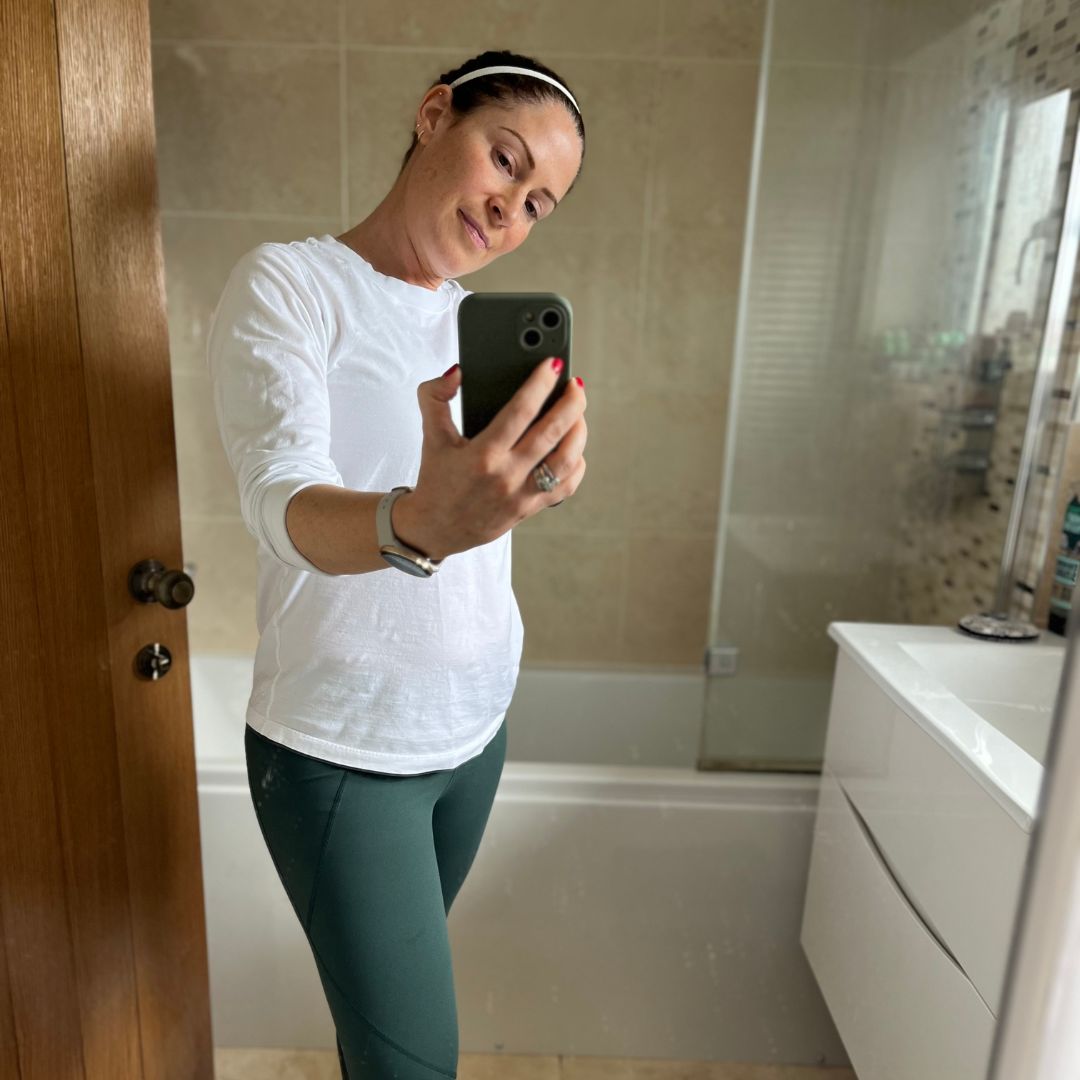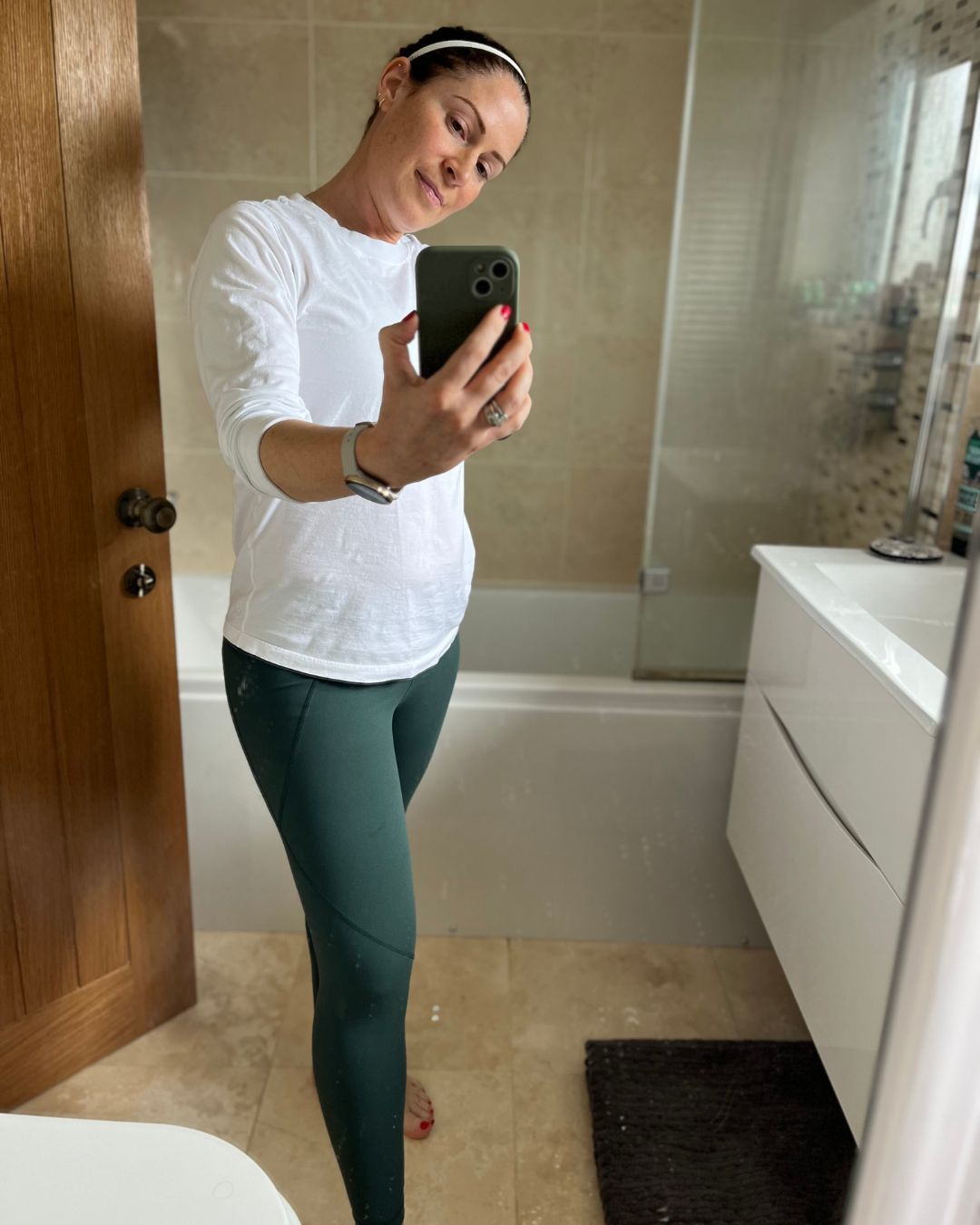
If there’s one thing I really need to work on, it’s my core strength. Three children combined with a hefty dose of perimenopause have delightfully combined to form a core that is less than solid – and while I don’t work out for aesthetic reasons, a little definition wouldn’t go amiss.
My main incentive for upping my abdominal game, though, is the myriad of benefits a strong and stable core yields. From improving athletic performance to enhancing functional fitness, our core really is our internal powerhouse.
Despite this, research (such as this study, published in the Journal of Biomechanics) shows that most people’s deep core muscles aren’t as strong as they need to be, potentially causing lower back issues – particularly in runners. I’ve been (slightly) upping my weekly mileage recently, so when my Health Editor asked me to do a core workout every day for a fortnight, it couldn’t have come at a better time, for me.
Generally speaking, I’m completely guilty of tacking a few ab crunches onto the end of my workout and considering my core work done, so my main question was: would a core workout everyday noticeably improve my strength over the course of a couple of weeks – and what, if any, are the drawbacks?
Keen to find out how I got on? Keep scrolling – and don’t miss our guide to ten core exercises personal trainers swear by, the best abs workout for women, and the best core activations, while you're here. Core workouts at home, at the ready.
I did a core workout every day for two weeks – here are my honest thoughts
What is a core workout?
First up: let’s be clear about what we mean by a core workout. It’s fair to say that the core might just be the most misunderstood muscle group in the body, with many of us (forgivably) thinking of the core as just our abs. Turns out, this is absolutely not the case. Here’s the science bit.
“The terms "core" and "abs" are often used interchangeably, but there is a distinct difference,” personal trainer Mandy Wong Outram previously told Marie Claire UK. “The core comprises all the muscles in the body's trunk, including your abdominal muscles (transverse abdominis, internal obliques, external obliques and rectus abdominis) as well as your multifidus, erector spinae, diaphragm, and pelvic floor muscles. On the other hand, the abs specifically refer to four muscles located between the ribs and pelvis on the front of the body: transverse abdominis, internal obliques, external obliques, and rectus abdominis.”
Essentially, our core muscles are all the muscles that wrap around and support our spine, from the base of our skull all the way to our coccyx (tailbone). So, in order to workout our core, we can’t simply bash out a few crunches. Happily, though, even exercises you may not associate with core work do, in fact, work out our mid-section – lunges and squats count just as much as planks.
@naireekiana ♬ UNAVAILABLE (feat. Musa Keys) - Davido
4 benefits of core workouts
If you’re wondering why you should bother, well – where do we start? There are so many benefits to building and maintaining a strong core.
1. It improves posture and keeps our backs healthy
We could all use a little help with our posture, especially if we’re sitting down using screens all day, and a strong core is key.
If you think about your core as your body’s anchor - stabilising and supporting the pelvis and trunk - it stands to reason that if it is strong and stable, you’ll stand straighter and be less susceptible to aches and pains. These are often the result of your back overcompensating for lack of core stability.
2. It enhances functional fitness
Training your core is training your body to move more easily and freely whatever you do, otherwise known as "functional fitness." This includes lifting your children, carrying heavy loads, pivoting in sport or running for the bus.
“Your core is your powerhouse, facilitating the generation, transfer, and absorption of energy for real-world activities like running, jumping, and lifting—virtually every movement we do,” explains personal trainer and head coach at Wildstrong, Andrew Telfer.
“Through training, we can construct a robust, resilient core, capable of 360-degree support. This core is vital for daily life and injury prevention," he goes on. Bottom line: "A strong core will foster dynamic stability, safeguard our spine, and amplify overall strength.”
@deannaodfit ♬ suara asli - 𝙈𝙞𝙣𝙚.🎶 - 𝟑𝟎𝟑 𝐌𝐢𝐧𝐞.
3. It reduces the risk of injury
To build total-body strength, we need to work all our muscles. This can be a catch-22, as overtraining or simply doing the same moves over and over can lead to injury. That said, maintaining a strong core has actually been proven to help offset the risk of injury - so training enough but not too much is key.
Why? Well, a stable core allows our muscles to work together to support our spines, transferring force between our upper and lower bodies and minimising the strain on our joints and connective tissues.
4. It improves athletic performance
Still need convincing? A strong core might just help you smash your 5K PB. Studies (such as this one, published in the Journal of Behavioural Science) show that a strong core can enhance athletic performance – and we’re sold on it.
Is it ok to do a core workout every day?
While we know it’s great for us (both mentally and physically) to move more, rest is an important part of any exercise regime. With this in mind, I wanted to get the all-clear from the experts before starting my two-week challenge.
“As with any training, overexerting a muscle isn’t a great idea,” cautions personal trainer and founder of Wolf Approach Fitness, Kirsten Whitehouse. “Your body needs time to rest and recover to be able to work hard again. When we train, we actually cause tiny tears in our muscle - these heal and thus we get stronger - but we must give our body a chance to go through this process."
"For short-term training, you can do every day as long as you listen to your body and if something hurts, stop, and make sure your form is on point - if you cannot feel your core muscles switching on before or during your training, take a break.”
I did a core workout every day for two weeks – here’s how I got on
Week one
Fired up and ready to go, I was excited for the challenge to start. Fortunately, I tend to do some kind of workout - be it strength, cardio or more supportive movement such as Pilates - most days, so planning to add in a core workout didn't feel too onerous.
I started with my usual Pilates workout, and luckily it was a one-to-one session, so I was able to request a core-focussed workout. Let me tell you: core work on a Pilates Reformer is no joke. We also threw in some Pilates ring work and to say my core was engaged is an understatement!
The next day I was grateful (for a change) that it was a run day, figuring that at least my core would have a small break, before I headed home for a 10-minute ab chaser (there are loads of free workouts online - just be sure to chose one where you are confident in the moves, to ensure correct form). However, it didn't take long for me to realise what the experts said about us using our core for every. single. movement. we do was accurate - I literally felt my abs aching as I ran - who knew?
Desperate for a rest, I chose a lower body workout the next day, and thank goodness - the DOMS were real. That said, while usually, I wouldn't pay much attention to my form and posture on leg day, I was way more in tune with how my body was feeling and how I was holding myself - and figured this could only be a good thing.
By the end of the week, I'd got into a good rhythm with alternating core-specific moves like planks, dead bugs and bicycles with more full-body strength moves such as weighted squats and lunges.

Week two
So, it turns out that even for the most dedicated exerciser, performing the same moves every day can get a little dull. This week, I switched things up by incorporating some standing core moves in my weekly barre class, and I was surprised to find that I did feel (and see!) some benefits. I definitely felt stronger, and it felt easier to maintain good posture throughout the class.
Annoyingly, I woke up with a sharp pain in my ribs, and - worried I'd pulled an intercostal muscle - I turned to the experts for advice.
"Muscles need both work (mechanical tension) and time to rest and recover in order to grow and strengthen," advises personal trainer Beth Davies. "Doing intense daily core exercises may not allow for the recovery part and may lead to over training and injury."
Heeding the advice, I dialled the intensity down for a few days, and focussed on incorporating some breathing exercises into my workouts, in an attempt to soothe my aching rib muscles. Focussing on the breath is a valuable part of any well-balanced exercise regime, so I still felt as though I was achieving something.
By the end of week two, my muscle strain had healed far quicker than expected, and I was back to work. So, did I really notice the difference? Well - I'd have to say, my thoughts are mixed.
While a rippling six-pack was never my aim, I did notice a slight improvement in definition around my mid-section - a definite win. However, this could just as easily be down to where I was in my cycle, as we know that at some times of the month we retain more water, or the fact that I wasn't struggling with any bloating that particular day.
But I have to confess that I didn't feel much difference, strength-wise - and apparently, this is totally normal. "While consistency is key to seeing results, you might not notice significant changes in core strength in just two weeks," agrees Whitehouse. "However, you may notice more subtle changes, like feeling less slouchy, or some of the exercises feeling a bit easier than when you first started. And all of these can be super useful in keeping you motivated and focused on your goal."
Would I recommend a core workout every day? Honestly - probably not. While my injury was likely self-inflicted, I personally didn't feel like the gains outweighed the risks. However, we're all different, and some people might find a short core session every day works for them - as always, you do you.
Shop MC approved workout kit now:
Have you seen the new drop at Sweaty Betty? These animal-print leggings are a firm favourite - combining the benefits of the classic power leggings (butter soft, squat-proof, stay-put) with an on-trend (and dare we say, neutral?) print.







